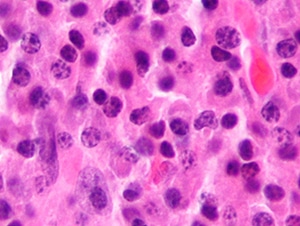A New CAR T-cell Therapy Option for Multiple Myeloma
The FDA recently approved the second cellular immunotherapy to treat certain adult patients with multiple myeloma.
The U.S. Food and Drug Administration (FDA) has approved ciltacabtagene autoleucel (Carvykti) to treat adult patients with relapsed or refractory multiple myeloma who have received four or more previous lines of therapy, including an agent that blocks protein degradation, a treatment that modulates the immune response, and anti-CD38 monoclonal antibody therapy.
Ciltacabtagene autoleucel is a type of chimeric antigen receptor (CAR) T-cell therapy. CAR T-cells are made using patient-derived T cells, a type of immune cell, that have been engineered to recognize and target a specific protein on malignant cells. Ciltacabtagene autoleucel targets the B-cell maturation antigen (BCMA), a protein expressed on multiple myeloma cells. The first CAR T-cell therapy of this class was approved in 2021.

The approval of ciltacabtagene autoleucel was based on the results of an open-label, multicenter phase I/II clinical trial that evaluated its safety and efficacy in 97 patients with relapsed or refractory multiple myeloma. The overall response rate was 97.9 percent. Among the 95 patients with responses to the therapy, the median duration of response was 21.8 months.
Ciltacabtagene autoleucel has the potential to induce a life-threatening inflammatory reaction known as cytokine release syndrome (CRS) and other abnormal immune reactions. Therefore, the manufacturer is required to conduct a long-term follow-up study on patients who receive the treatment, and the hospitals and clinics that administer the therapy are required to be specially certified to manage CRS.
Multiple myeloma is a disease that affects plasma cells, a type of blood cell derived from B lymphocytes. Abnormal plasma cells accumulate in the bone or soft tissues of the body in patients with multiple myeloma. According to federal statistics, multiple myeloma is expected to be diagnosed in over 34,000 people in the U.S. in 2022.
The FDA decision was rendered on February 28, 2022.
